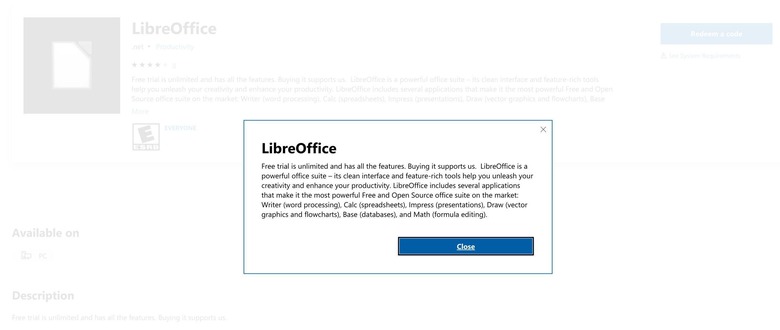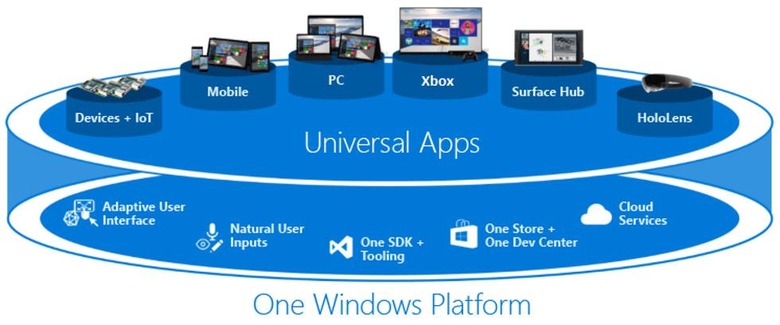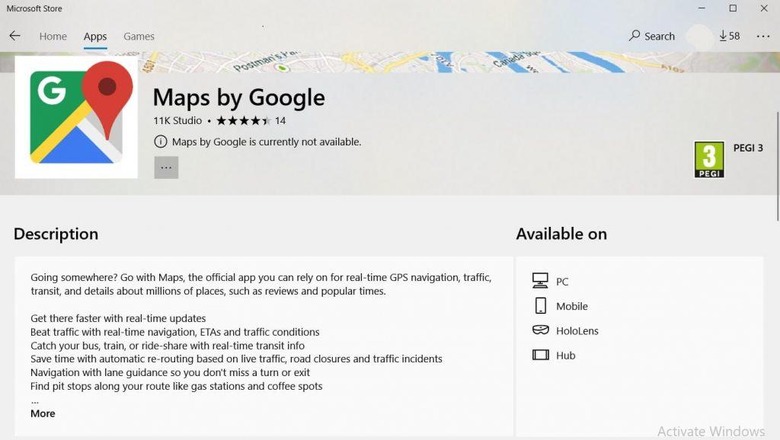Microsoft Has A New App Store Problem
Microsoft started in earnest to carve out its own app store platform back in Windows 8 and it was a disaster. Barely anyone paid attention to it, which also left its Windows RT variant devoid of actually useful apps. It tried again with Windows 10 and its Universal Windows Platform (UWP) and had more success. But now it might have a new problem it needs to deal with and fast. With the influx of new apps on its Microsoft Store, the company now has to face the reality that there are some who are ready to game the system to trick users, even to the point of getting them to pay for something.
LibreOffice con
Fortunately for Microsoft, it's not a widespread problem, at least not yet. In addition to having very few apps in the first place, the Microsoft Store is still relatively young. At the same time, that is also an open invitation for enterprising individuals to try and make an easy buck or at least cause some confusion.
The latest and so far highest profile case involves the open source office suite LibreOffice. Given the slow march of open source software into the proprietary Microsoft Store, its arrival and presence definitely generated some interest. Curiously, the app ran a trialware system where buying it claims to support The Document Foundation, the non-profit organization behind LibreOffice.

It turns out, however, that it's all a scam. The Foundation's Italo Vignoli responded to a BleepingComputer piece with this statement:
"The Document Foundation has been made aware of an unofficial version of LibreOffice on the Windows Store. We are investigating further, but we want to be clear: this is not an official version created by The Document Foundation, so the app's page is misleading. The only official source of the software (which can be downloaded for free, i.e. without any cost for the end user) is LibreOffice website: https://www.libreoffice.org. Also, the money from the Windows Store version is not collected by The Document Foundation."
This mirrors a case reported by WinBuzzer just last week where third-parties unaffiliated with Google have made available Progressive Web App (PWA) versions of Google's apps on the Microsoft Store. The apps have been made unavailable though they are still listed for everyone to see Microsoft's error.
UWP and PWA rush
The two cases use two different ways to get into the Microsoft Store. In LibreOffice's case, the publisher simply named ".net" used Microsoft's Desktop Bridge to convert a regular Windows application into a UWP app. Given the fact that LibreOffice is free and open source software, it wouldn't have been difficult for any developer to do so. In the Google apps case, the con artists used the relatively new support for PWAs in the Microsoft Store.

Both cases also highlight the dangers Microsoft faces in its rush to get more apps into its store. In fact, it might be desperate. Although its UWP thrust seemed to have worked, more and more app developers, especially the big ones, are also leaving. Its addition of support for PWAs can easily be seen as a compromise to get them back on board with the web apps they already have.
But Microsoft's strategy can easily backfire as these cases show. It is painting a picture of the Microsoft Store as the way to ensure security and safety and yet it has twice failed to actually ensure those apps themselves. It may be early, but it should actually start scrambling to batten down the hatches. Fortunately, it also has the advantage of hindsight.
Google Way, Apple Way
There are currently two methods in managing app stores that seem diametrically opposed. The most famous, perhaps, is that of Apple, who exercises an iron fist over its app store. It meticulously screens every app with human eyes and hands and it is quite proud of it. While there might be some that do slip through the cracks, very few get past the Eye of Apple.
On the other extreme sits Google, who takes a hands-off approach except when necessary. It is proud of how it automates the checks rather than burdening humans with such hard labor. It scales better to the thousands of apps applying for space but it doesn't always work.

Microsoft is right in the middle and not by choice. It doesn't have the same machine learning and AI prowess as Google to leave it all in the hands of automation. But it also can't afford to turn away applicants too much. In fact, it's practically begging for them to come. It has some automated tests and some human-controlled test but evidently they aren't working well at all.
Wrap-up
Microsoft isn't at a crossroads yet but it shouldn't wait until it is. Truth be told, the Microsoft Store is all but ridiculed in the app store circles. Now its credibility is already on the line even before it has the chance to establish it. It has the advantage of having history to learn from and a smaller set to work with so it really has no excuse for having a shoddy performance. But, then again, Microsoft doesn't really have a track record when it comes to software integrity anyway. Now might be a good time for it to take action before it's too late.
